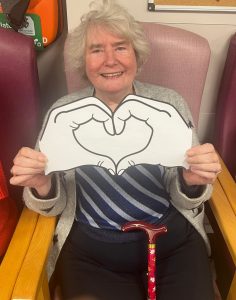Menu

The theme of this year’s International Women’s Day is #InspireInclusion. This presents a timely opportunity to address the importance of inclusivity for individuals with dementia. M oreover, as we commemorate International Women’s Day, it’s essential to acknowledge how dementia disproportionately impacts women. This presents a significant chance to discuss how we can create a more inclusive world that supports and uplifts individuals living with dementia, especially women.
oreover, as we commemorate International Women’s Day, it’s essential to acknowledge how dementia disproportionately impacts women. This presents a significant chance to discuss how we can create a more inclusive world that supports and uplifts individuals living with dementia, especially women.
It’s estimated that half of us will have our lives affected by dementia in some way or another. Research conducted by the Alzheimer’s Society shows that dementia is the most feared condition among the UK population. This comes as no surprise, given the devastating impact dementia can have on individuals and their loved ones. However, amongst all these challenges, there is hope. With the right support, people can live happy and purposeful lives. At ADSS, we see the immense footprint adequate support can make on the lives of people affected by dementia, and that’s why we so proudly work so hard at getting that support right.
When it comes to thinking about inclusion for all, there’s no realm where this is more evident than in the case of individuals with dementia and their caregivers. This is because people affected by dementia face many injustices and are denied opportunities to live the life they deserve.
So, why do I say dementia disproportionately impacts women, and why is this an inclusion issue? Firstly, there are more women than men affected by dementia. Women over 60 are twice as likely to develop Alzheimer’s, the most common form of dementia, and dementia is the leading cause of death for women in the UK. While the higher life expectancy of women, with age being the primary risk factor, partly explains this prevalence, it doesn’t provide the whole picture. There is an urgent need for more research to understand the impact of hormonal changes and women’s health behaviours on increasing the risk of Alzheimer’s. If you’re interested in contributing to research, please consider getting involved with Join Dementia Research.
Women are also more likely to serve as primary family caregivers for individuals living with dementia. The latest Census data revealed that women are more likely to assume care giving roles across all age groups until 75-79. Numerous societal, practical, and circumstantial factors often lead women to take on the responsibility of caring for spouses, parents, siblings, parents-in-law, and occasionally even grown-up children with dementia. It’s estimated that 600 caregivers, regardless of the condition of those they care for, exit the workforce daily. While the introduction of the Carers Leave Act in April this year provides statutory carers leave, it is unpaid and, therefore, may only be feasible for some. At ADSS, our teams provide support to women who are balancing care giving responsibilities with caring for children or grandchildren, as well as maintaining employment.
those they care for, exit the workforce daily. While the introduction of the Carers Leave Act in April this year provides statutory carers leave, it is unpaid and, therefore, may only be feasible for some. At ADSS, our teams provide support to women who are balancing care giving responsibilities with caring for children or grandchildren, as well as maintaining employment.
Lastly, there is a financial disadvantage that women face when their husbands require the high level of care that dementia often necessitates. Recently, our Board of Trustees had the opportunity to meet with two remarkable and dedicated carers: one man caring for his wife and one woman caring for her husband. Both expressed similar financial concerns regarding the assessment for care home placement. However, due to the individualized nature of the financial evaluation, the husband with dementia is required to cover all of his care fees. In contrast, the wife with dementia, having minimal pension or assets of her own, qualifies for local authority funding. This disparity is leaving many women carers in financial distress, as the funds they had earmarked for their retirement are now being used to cover care home expenses. This situation also adds to the stress of uncertainty about their future once the funds they had planned to rely on together are depleted.
there is a financial disadvantage that women face when their husbands require the high level of care that dementia often necessitates. Recently, our Board of Trustees had the opportunity to meet with two remarkable and dedicated carers: one man caring for his wife and one woman caring for her husband. Both expressed similar financial concerns regarding the assessment for care home placement. However, due to the individualized nature of the financial evaluation, the husband with dementia is required to cover all of his care fees. In contrast, the wife with dementia, having minimal pension or assets of her own, qualifies for local authority funding. This disparity is leaving many women carers in financial distress, as the funds they had earmarked for their retirement are now being used to cover care home expenses. This situation also adds to the stress of uncertainty about their future once the funds they had planned to rely on together are depleted.
So, ho w can we address these injustices and promote inclusion this International Women’s Day?
w can we address these injustices and promote inclusion this International Women’s Day?
By Katie Antill
CEO – ADSS
Sign up to receive our email updates
By submitting this form I agree to the ADSS privacy policy, details of which can be found here
Contact Us
Alzheimer’s and Dementia is a registered charity in England and Wales (1173379). A company limited by guarantee and registered charity in England and Wales (10690071). Registered address: Safeharbour, Coldharbour Road, Northfleet, Kent DA11 8AE